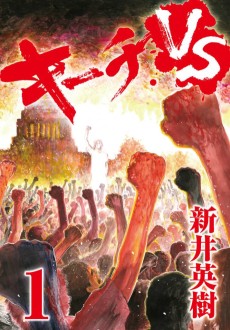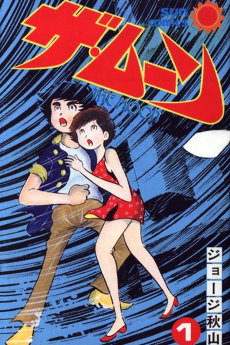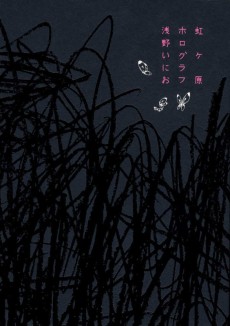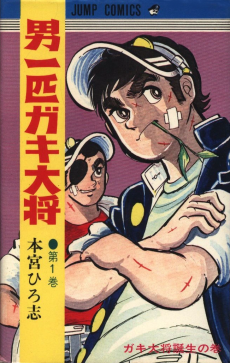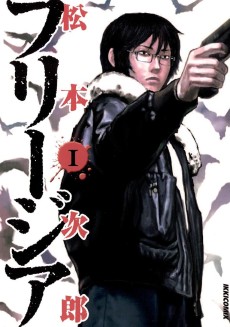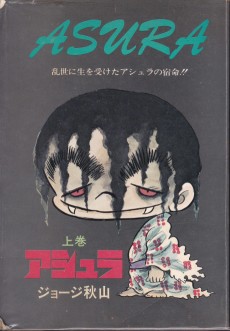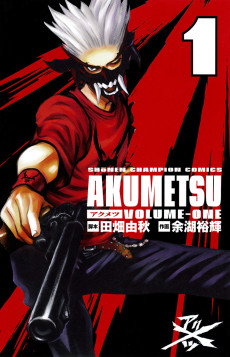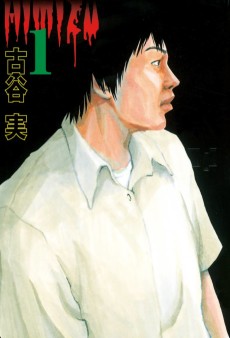KIICHI!!
STATUS
COMPLETE
VOLUMES
9
RELEASE
Invalid Date
CHAPTERS
87
DESCRIPTION
Left to himself at an early age in the slummiest parts of today’s Japan, Kiichi learns how to survive on his own. As a teenager, how can he adapt to a society whose rules he rejects? Unless he creates his own rules… Kiichi, a raw icon of strength and integrity, stands alone against the world’s injustice and becomes an unforgettable character.
CAST
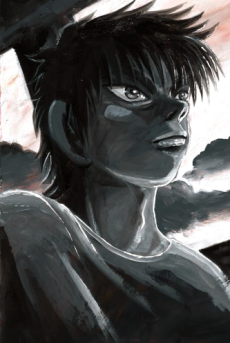
Kiichi Someya
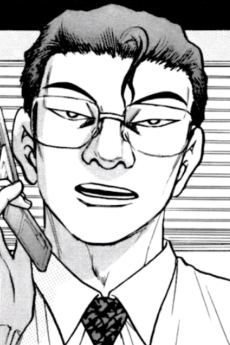
Keiichiro Kai
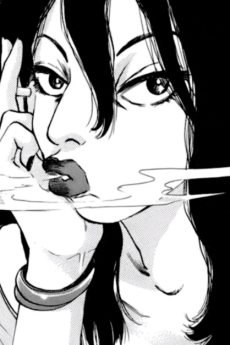
Misato Saji
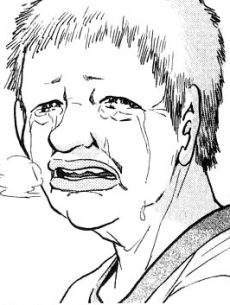
Nojiri Mayumi

Chinatsu Someya
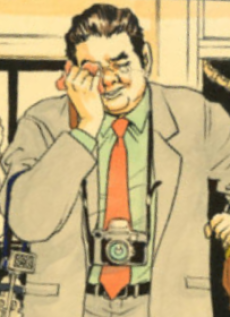
Goro Someya
CHAPTERS
RELATED TO KIICHI!!
REVIEWS

Aidashpy
85/100A Child's Sense of Justice: Revolution Through the Eyes of KiichiContinue on AniListKiichi is a manga that centers around the life of a young boy who has faced more adversity in his short four years of existence than many experience in their entire lifetime. Throughout the story, readers are given a glimpse into the tragic and tense childhood of Kiichi, who has been exposed to a world of violence and corruption that has left an indelible mark on him. Despite his young age, Kiichi's character is developed in a way that showcases his strong moral compass and sense of justice, which often leads him into confrontations with those who are perpetuating the injustices he has witnessed.
As the story progresses, Kiichi becomes increasingly aware of the societal issues that plague Japan, including bullying, homelessness, child abuse, and forced prostitution. His acute sense of what is right and wrong in the world drives him to challenge the exploitative and corrupt systems that perpetuate these problems. Kiichi's childlike determination to create a better world for himself and others is a powerful message that resonates through every panel of this manga.
What sets Kiichi apart from other manga is its unique use of a child's perspective to address complex social and political issues. Despite being a young boy, Kiichi possesses a sense of justice that allows him to see through the veneer of respectability that often shields those in power from scrutiny. This perspective highlights the inherent flaws and contradictions in Japanese society that are often overlooked or ignored. By using a child's perspective to tackle these issues, the manga sheds light on the problems faced by vulnerable and marginalized members of society who are often ignored by those in power.
Kiichi is a manga that raises questions that challenge the status quo of peaceful protest. The central question that Kiichi poses is how far we can get in the fight for change through only peaceful means. The manga suggests that peaceful protests have their limitations and can only get us so far in bringing about change. The systems in place are designed to resist peaceful protests and uphold what's been already established, which is why sometimes more forceful measures may be needed to enact change. Although this is a controversial topic, Kiichi does an excellent job of demonstrating how the systems in power are built to protect those who hold it, perpetuating a vicious cycle of inequality and injustice. It calls into question whether peaceful protests are the most effective way of breaking through these corrupt walls.
Another interesting idea that Kiichi touches upon is the complexity of the relationship between family members. We grow up with our families, and our parents are often our first role models, teachers, and caregivers. It can be challenging to acknowledge the possibility that our parents may have flaws or even be terrible people. However, Kiichi highlights the harsh reality that our parents are just as susceptible to making mistakes or committing crimes as anyone else in society. It can be an incredibly difficult thing to come to terms with, but it is important to be able to recognize their problems and acknowledge their mistakes.
Overall, Kiichi is a compelling manga that delves into the tragic and tense childhood of a young boy who is forced to confront the harsh realities of Japanese society. By using a child's perspective to address complex social and political issues, the manga sheds light on the flaws and contradictions that are often overlooked or ignored by those in power. Kiichi's story is a testament to the power of resilience and determination in the face of overwhelming odds, and his unwavering commitment to creating a better world serves as a powerful message that resonates with readers.


atomx
100/100Growing Up In A Broken WorldContinue on AniListDissecting Kiichi!! - Analysing Symbols, Metaphors and Themes
Major Spoilers Ahead
While Kiichi works well as an Introduction to the story that later transforms into Kiichi!! VS it shines on its own as an exploration of maturing through the lens of Kiichi and as a critique of modern capitalistic Japan.
Kiichi is introduced to us as a problematic child that rejects seemingly everything thrown at him. He rebels against every authority figure and has no friends in school as he beats them up for no apparent reason. The only people he feels attached to are his parents, who care for him and tolerate his extreme nature. It becomes clear how strong his bond with his parents is when he leaves home for the first time and ends up at the sea. He starts crying and wants to see his mother, for the first time he acts like a normal child.
The sea is an important motif in Kiichi symbolising his bond with his mother - “So there’s Daddy, Mommy and Kiichi. Daddy was born in the mountains. Mommy grew up by the sea.”Later on in Volume 1 we learn that Kiichi actually has reason for his actions. When a classmate steals the stuffed animal of a girl he raises his fists and beats him up. Kiichi dislikes injustice, when seeing it he raises his fists and beats up whoever did any wrong. Although his methods are extreme he does not beat anyone for no reason.
Another important thing is that he condones mistakes. Although his teacher wrongly accused him for pushing another classmate, he tells her not to quit her job. He accepts that humans make mistakes and can better themselves.When stumbling upon an abandoned cat his parents explain to Kiichi that caring for a pet requires determination and sacrificing personal comfort. He is given the opportunity to keep the cat however he would have to give up his toys and free time. Following his rejection of the offer his parents argue and Kiichi thinks that leaving the cat had a terrible effect on his parents relationship.
Returning to the cat he witnesses it being driven over by a car and it being on the brink of death. Raising his fists he decides to give up his toys and take the cat home to his parents. Although he ends up being dead his parents are proud of him and Kiichi is happy.
So, what is the takeaway of this event? It is a metaphor for the rebellion/revolution that would later fascinate Kiichi. Capitalism has created an extreme comfort for us that has made us ignorant. We would rather not sacrifice our own comfort to stand up against injustice (Ignoring the cat for it would mean giving up his toys). It is only when realizing what the injustice can lead to (Parents fighting) that we will take action (Kiichi sacrificing his toy).
The second volume introduces a major plot twist: the killing of Kiichi’s parents. It traumatizes Kiichi immensely with him being unable to sleep and losing his will to fight completely. Now begins his time of living with homeless people. Social disparities become more obvious and Kiichi learns how fragile life is when he is attacked with a taser by Maeda, to which he raises his fist once again, showing that he has regained his will to live.
Maeda becomes an important character in this arc as he tests Kiichi when giving him the choice of choosing a toy soldier or money. He takes the money and leaves the toy soldier (A representation of his childhood) behind.
The aforementioned fragility of life only becomes more clear when Maeda kills the mafia boss that resembles Kiichi’s father. It reminds him of his parents death and he envisions their dead bodies standing before him. Behind him stands his old self, happily staring at the dead bodies, seemingly unbothered.
At the start of the volume is an important quote that explains most events in it - “A seagull who can cut through the wind doesn’t question how it flies.”
Seagulls are a leading symbol throughout the whole arc showing how we only question our ways of living once they are interrupted. Kiichi only becomes aware of the injustices of society when his parents are killed and his comfortable life is interrupted.
In a broader sense it is a representation of how revolution is only possible when we become aware of the injustices going on. Outsourcing labour to other countries like China or Bangladesh makes it so that we no longer see the suffering that is created by our consumption and we do not feel the need to revolt.Volume 4 takes us to another location and introduces more characters. Kiichi witnesses sex and tries to grasp the concept of love. Most importantly he learns to become his own person. Kenji explains to him that being able to catch your own food is a sign of becoming your own man. Kiichi buys fishing equipment and after seeing a TV program about grilling he decides to grill his own fish. Even Though he fails initially he gets his page of the newspaper to catch fire and lifts it into the air. Standing in front of the sea he watches into afar as his flame burns brightly; A sign of him becoming his own person, as he stands between the sea (Mother) and the mountains (Father) his own flame of life ignites.
The concept of becoming your own person only becomes more apparent in the following dialogue. Being happy although you are alone is a victory. A representation of this is Kiichi catching a fish, cooking and eating it. He looks up at the sky and sees a bright light. He affirms his own existence by showing that he is happy although his parents are dead.

The Timeskip separates Kiichi’s early childhood and adolescence. While the former focused largely on him learning how to be his own person, his adolescence is based around his growing dislike of society and his rebellion against it.
In school Kiichi introduces him by saying that he would like to be left alone. He does not want to make any friends nor enemies. Kai questions if this is even possible, which alludes to our world. Is it possible to take a neutral stance in our modern day society? No, once injustices happen we have to take a stance or we become accomplices to an unjust system.
This dilemma or moral conflict later develops into the whole prostitution case. Kiichi could have simply ignored it all but he decides to help Misato.There is a moment in the fifth volume where the whole class plays dodgeball and a jealous girl hits Misato with a ball at full speed. Misato does not speak up, the girl does not apologize, the class does not care and the teacher does not intervene. Kiichi is suddenly filled with rage and beats up literally everyone in the class including his teacher. He hates group-mentality, a common phenomenon in Japan. The meaning of the phrase “I want to live alone” becomes less blurred. It does not refer to being alone in the sense of having no one around you but thinking and living for yourself. The class is not a group of individuals but it turns into a collective that no longer represents its individual parts and instead creates an amalgamation of people that do not think for themselves.
“There are too many in this world suffering like this. Cowardly we turned our heads away. We preferred to close our eyes. But Kiichi is not like us! He chose not to look away! He preferred to raise his fist! Only problem was that he didn't do it figuratively. But was it really a bad thing?”
This is also foreshadowing by Arai that sometimes violence is the answer (which becomes an important topic in VS). When we are left with no other choice, is it bad to use violence?
Misato’s sexual abuse and Kiichi’s revolution into the mainstream is the center of the last few volumes. Finding out that simple violence does not solve the problem and that the government and police of Japan is rotten as well, Kai proposes that Kiichi exposes the scandal by staging a mini-revolution. Arai heavily criticized the Japanese population. They have become completely indifferent to what is going on in their country. Prostitution of minors is not something worth talking about, it has already become so normalized that it no longer shocks citizens.
“A naive glance is often better to see the atrocities of this world than a look jaded by years of compromise”
When they start their trip to film Kiichi beating up the people involved in Misato’s prostitution they start with her father. As Kiichi raises his fist to hit him he suddenly stops. He feels no need to hit him but does not really know why. All he knows is that he is not the true “real enemy”. Misato’s father is simply a cog in the machine used by the true elite. While his actions are terrible and disgusting he only committed them out of poverty. Of course this does not excuse what he did but it is important to recognize that he himself was taken advantage of by the people that paid to have sex with Misato.
If the system creates these disgusting people, shouldn’t we get mad at the system and not at the individuals?“The police and the media all yield to the pressure. And choose to become the cogs of our system. They are even more reprehensible than the morons who can’t see beyond the tip of their nose. Those who do not act when having the ability to do so are the culprits, and those who cannot do anything are helpless. The world is an agglomerate of weaklings and cowards”

The revolution builds the final part of the manga before the epilogue and has arguably the strongest messages and quotes.
“Who is the true enemy?”
“The man in the Mercedes? He offered him money!”
“The man who fought back? Why me and not the others? "He asked."
“Can we upset at an invisible enemy?”
“GET ANGRY!!”
“WAKE UP! GET ANGRY!!”
“ANGRY!!”Following the initial video Kiichi tries to come up with another speech but encounters a problem. He does not see the society he wants to talk to. He wants to talk to people who can truly hear him. Not a society that will twist his words and dumb down his message. A society that has become so ignorant they could not be called awake for they are asleep to reality.
“Since nobody acts, I am the one who has to! Can you see me? I am here!! I am alive!! I... am... here!!”
Over is the revolution. Now come the conspiracies and the media trying to undermine what has happened. It may seem like a failed attempt at changing the system but all this is only the start of an even greater revolution. People are awake now, Kiichi has shown them that there is someone who will act and not just live his life comfortably.
“If the world and society are both wrong. We just have to change all of it.”
The ending might seem a bit lackluster since the revolution was the climax of the manga but it is a beautiful way to round up Kiichi’s childhood. He visits Akimoto and for the first time admits that he wants to see her. Showing his true feelings is what he had never done and why he was still considered a “weak adult” by his grandma
“You need to accept your feelings. Joy. Sadness. These are what keep us alive! Promises and responsibilities are secondary. Only what comes from the heart matters! Don’t you have the courage to accept your feelings!!”
Akimoto suddenly wakes up. Crying in the car, Kiichi slowly raises his fist. He is alive.

SIMILAR MANGAS YOU MAY LIKE
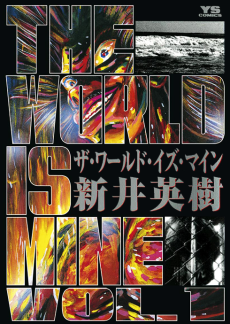 MANGA AdventureThe World Is Mine
MANGA AdventureThe World Is Mine MANGA DramaOyasumi Punpun
MANGA DramaOyasumi Punpun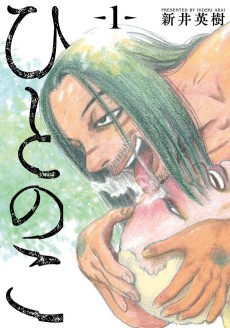 MANGA DramaHito no Ko
MANGA DramaHito no Ko MANGA ActionTogari Shiro
MANGA ActionTogari Shiro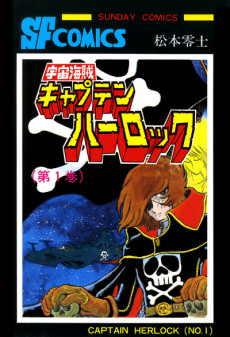 MANGA AdventureUchuu Kaizoku Captain Harlock
MANGA AdventureUchuu Kaizoku Captain Harlock
SCORE
- (4/5)
MORE INFO
Ended inInvalid Date
Favorited by 276 Users

